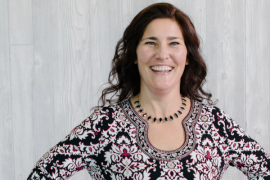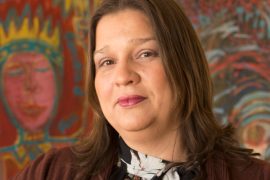NICK BUTLER
BONA FIDE BEST-SELLING NOVELISTNick Butler is an unassuming fellow, the friendly kind of guy you’d like to play a game of ball with, then peel off for a few cold beers and bar-stool conversations. To read his first book is to know him, a little bit. In it he gathers up our familiar, welcoming Midwestern landscape and aspects of himself in characters complex enough, yet easy to know. And that, perhaps, is what resonates most about his best-selling debut “Shotgun Lovesongs”—the something genuine at its heart.
BRAVA catches up about writerly influences with Butler, who lived in Madison for 10 years and has returned to Eau Claire, where he and wife Regina built their home in the rolling countryside. There, he’s at home dad to their two young kids as much as he’s headlong into his third book, “The Faithlessness of Men.”
Q: Let’s make this fun. In five words or less describe your first novel, your just-published second book and the in-progress third.
“Shotgun Lovesongs”—Wisconsin: friendships, marriages, ambitions, exile.
“Beneath the Bonfire”—Chainsaws, leftovers, revenge, fishing, mushrooms.
“The Faithlessness of Men”— Fathers, wives, sons, Scouts, baseball.
Q: What from your upbringing influenced your writing? I give all the credit in the world to my
teachers. They let me read books beyond that of the curriculum, and for that, I am forever grateful. I hope that spirit comes through in the book: gratefulness. I think our state could use a healthy dose of thankfulness right now in terms of how we talk about teachers and public service employees in general.
Q: What about the “Shotgun Lovesongs” characters—are they drawn from your own life?
The most honest answer to this question is that the characters are all permutations of me. Obviously the Lee character is inspired by Justin Vernon [Eau Claire native and front man for the band Bon Iver], but the truth is, I haven’t talked to Justin in more than 15 years, so I could hardly “base” a character on him. And, I’m not a musician. I don’t know anything about making music. But, I know how difficult it is to write a book, to have a vocational passion (so to speak) that most people simply don’t understand. So when I was writing the Leland character, I was really writing about my own trepidations. Beth is a stay-at-home-mom and I’m basically a stay-at-home-dad. Kip is kind of a jerk and I tell people that he is emblematic of all my worst traits. Henry is like an old draught-horse, and I think I have some of those stodgy, quiet characteristics, too. And Ronnie has been traumatized by a brain injury, something I’m familiar with because of my father’s aneurysm.
When I was writing the first chapter of this book, I was alone, in my apartment in Iowa City, away from my wife and son, and the only thing I wanted to do was get back to Eau Claire, to my family and my friends. And I wanted to show my classmates what Wisconsin looked like. So I described aspects of my own wedding, and created a small town that was similar in my mind to Eleva and Strum and Independence and Fall Creek. I populated the town with people that were familiar to me—probably because, as I said, they’re permutations of me.
Q: The book’s setting, small town Little Wing, seems about to languish. But two of the friends come back. What’s the lure?
Well, I think they come back because, at least for me, there’s a certain gravity to your hometown, a certain shared history. I think Kip and Lee come back to Little Wing to be part of a community, and because they’re comfortable in that place. I think Lee is an authentic sort of soul and just doesn’t care to be part of some glitterati. I think he values nature and privacy and I think he’s inspired by the landscape and his friends. For Kip, I think he’s constantly seeking approval from his friends.
Q: You live on a gorgeous country plot. Does the landscape influence who you are and what you write about?
I think the short answer is, yes. Lately, I’ve been preoccupied by Wisconsin politics, and in particular frac sand mining. We live on the cusp on the Driftless Area, and our property is situated toward the top of a tall ridge. I’ve become anxious about our landscape. Not just my backyard, but the entire state. We also own quite a bit of acreage, though certainly not as much as many of my neighbors. Since we moved here, I began asking myself, “What is enough?” and “What would you fight for?” I’m thinking a lot about the writer Rick Bass, and his career, how landscape shaped his art. I’d like to write with his passion and attention to nature.
Q: In the book, Beth was Lee’s first muse. Who or what is yours?
I don’t believe in muses. I believe in sadness, loneliness, desire, hard work and a big chip on the shoulder. I believe in being afraid. I believe in shitty jobs and abusive bosses and poor wages. I believe in partnerships; in friends and spouses that are sounding boards. I believe in trying to get better. I believe in reading a lot of books. I believe in writing hand-tooled letters. I believe in watching good movies. I believe in too much coffee.
Q: What are your favorite aspects of the writing process?
I like feeling surprised, when I write something that is totally unexpected, or deeply personal in some way, and then I’m just kind of, I don’t know, like, confessing something. I like when a narrative is moving in some direction and a plot feels unresolved or phony, and then, through muddling along, and nonstop thinking, you solve some kind of storytelling glitch. That is deeply satisfying to me. Like finishing a puzzle.


